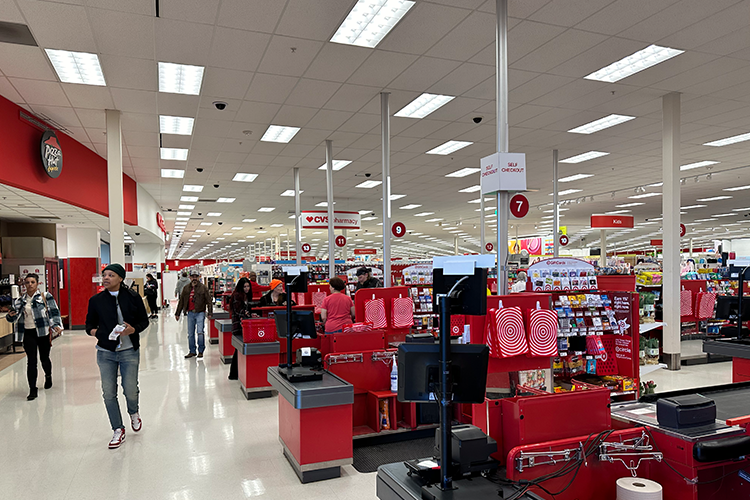
TJ’s local Target has faced many adversities when it comes to stealing. photo by Ravi Apte
The massive franchise has faced much adversity when it comes to preventing theft.
Target, one of the biggest chain stores in the United States, is currently facing many problems when it comes to theft. Since the beginning of 2023, Target has seen a 120% increase in organized theft. The rise in crime has prevented many big retailers, Target included, from continuing to operate safely and responsibly.
Theft is usually fairly difficult to measure due to it going unreported, employee theft, and damages. Many stores have hired loss prevention officers, also known as LPO, which is the most dangerous job a person can have when working in a big franchise. Target takes loss prevention very seriously. Other stores, such as Walmart and Best Buy, have loss prevention officers who barely get paid enough to care, let alone put themselves into danger. For many LPOs, any customer is a threat. As a result, many stores have implemented a “no touch” policy for their officers, meaning LPO are not allowed to touch or even pursue suspects. If a LPO does pursue and touch a suspect, especially if they are innocent, it can cause a lawsuit.
Another cause for the dramatic increase in stealing has been due to recently added self-checkout lanes. The issue with self-checkout lanes is that employees don’t know whether the stealing was an honest mistake or if the customer intended to steal the item. This puts many employees and clerks who are not trained in security in a position where they need to make decisions that could put themselves in danger. Accusing someone, whether the accusation is true or not, often results in anger. As a result, some Target stores have taken it to the extreme and closed down stores where they felt their employees were unsafe. Due to rampant theft, Target has been forced to close nine stores throughout the United States
Senior Josiah Quarcoo, a current employee, depicted Target’s protocol around stealing. “I can only redirect people to the checkout lane, and we have an assets protection team who focuses on trying to minimize the amount of people stealing,” he explained. Target has also taken many steps in order to prevent stealing that doesn’t involve employees, such as locking up merchandise, increasing surveillance at self checkout lanes, and limiting items that can be rung up at self checkout.
There have been several Target store closures due to the organized crime rate, but that may have not been the only reason for these store closures. According to a Consumer News and Business Channel (CNBC) investigation, “most of the Target stores closing had fewer crime incidents than the stores left open nearby,” which implies that Target has been using the organized crime rate as an excuse for internal issues that may have been their own mistakes. Target issued a statement saying that the investigation’s conclusions were “fundamentally flawed” and “disregard[ed] key facts.”
In fact, Target runs one of the country’s top-rated forensic laboratories, which specializes in “organized retail crimes committed at Target stores through video and image analysis, latent fingerprint and computer forensics.” Target is actually known for letting their customers – or, technically, not customers – get away with stealing until they reach the threshold for a felony shoplifting charge. For example, Target may allow someone to steal 100 $5 DVDs over time, all while building up a case against them. Eventually, when the threshold is reached, Target will send the police after the perpetrator and they will likely be charged with a felony. All in all, Target is probably one of the worst businesses to steal from out of the big franchise stores.
Overall, the new era of self checkout and new technology has led to more theft and cheats in the system. At the end of the day, theft tends not to go unpunished, and Target has been working hard to keep it that way.
Photo by Ravi Apte.